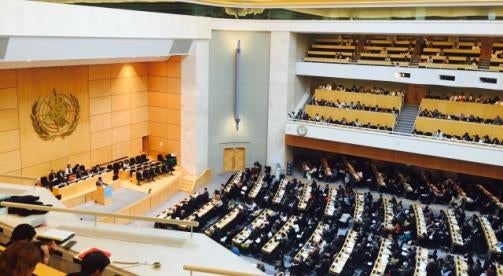Every year in May, the health ministers from all 194 World Health Organization (WHO) Member States meet at the WHO headquarters in Geneva to attend the World Health Assembly (WHA). As the decision-making body of WHO, the WHA is responsible for reviewing and adopting global health strategies, determining the policies of the organization, and reviewing and approving the program budget. At the 69th WHA — which took place from May 23rd to 28th — Member States approved several highly anticipated and historic resolutions concerning WHO governance reform, emergency response capacity, and priority setting for the 2030 Sustainable Development Agenda.
Key Resolutions Approved by Member States
Over the course of six days, delegates reviewed, approved, and adopted the texts of resolutions from a record-breaking schedule of 76 agenda items involving global health and WHO financial and management matters.
Increasing Capacity for Emergency Response: Lessons from Ebola
In 2015, WHO commissioned an international review committee to assess its response to the Ebola outbreak in West Africa, which caused over 11,000 deaths in the largest Ebola outbreak ever recorded. The committee determined that an appropriately coordinated emergency response would have reduced disease mortality and burden in West Africa. According to the assessment, “before August 2014, WHO did not appropriately seek support from other United Nations agencies and humanitarian actors in the United Nations Inter-Agency Standing Committee system,” adding that, “at an earlier stage, these resources could have been made available and known systems put in place; these might have averted the crisis that led to the need to establish the United Nations Mission for Ebola Emergency Response.”

May 23, 2016, Geneva | Representatives from WHO Member States gather on opening day at the 69th World Health Assembly Photo Credit: Katherine Fragoso
At the Assembly, Member States reviewed the assessment and agreed that WHO’s response reflected an inadequate implementation of the International Health Regulations (IHR; 2005), the only international legal instrument governing global health security. The health ministers approved the committee’s recommendations to strengthen implementation of the IHR (2005) and called on WHO to conduct external assessments of Member State compliance to core health capacities defined in the IHR.
To further strengthen emergency response capacity, Member States also approved a resolution to establish the WHO Health Emergencies Program. According to WHO, the unprecedented program expands the organization’s “operational capabilities for outbreaks and humanitarian emergencies” and is designed to deliver “rapid, predictable, and comprehensive support” to countries affected by public health emergencies.
The resolution more than triples the WHO Program Budget for emergency response to USD$494 million for year 2016-2017.
WHO Governance Reform: Protection against Undue Influence and Conflicts of Interest
Considered the “most difficult item to negotiate” by WHO Director-General Dr. Margaret Chan, the Assembly adopted the Framework of Engagement with Non-State Actors (FENSA) to manage and strengthen WHO engagement with non-state actors (e.g. nongovernmental organizations, private sector entities, philanthropic foundations, academic institutions). Finalized after years of deliberations, the resolution provides a framework to better identify and manage the risks associated with these partnerships, particularly against serving the special interests of non-state actors that grant minimal benefits to public health, provide undue influence on WHO, and create conflicts of interest.
Achieving the 2030 Agenda for Sustainable Development
In September of 2015, United Nations Member States adopted the 2030 Agenda for Sustainable Development. Steered by the United Nations Development Program (UNDP), the Agenda identifies 17 ambitious Sustainable Development Goals (SDGs) for ending poverty, hunger, and inequality, ensuring access to health and education, and controlling climate change by 2030.
At the Assembly, Member States approved a framework for aligning WHO priorities and finances with the 2030 SDGs, particularly for Goal 3: Ensure healthy lives and promote well-being for all at all ages. The resolution identifies universal health coverage and multisectoral collaboration as key strategies and Member States called for increased technical and financial support to strengthen their own capacity for monitoring progress.
By the time of Director-General Dr. Margaret Chan’s closing remarks at the 69th World Health Assembly, Member States had approved and adopted several resolutions closely aligned with the 2030 Agenda to reach international targets for childhood obesity, violence, women’s and children’s health, noncommunicable disease, healthy aging, tobacco control, road traffic deaths and injuries, nutrition, HIV, hepatitis and sexually transmitted infections (STIs), mycetoma, environmental health, research and development, and strengthening health workforce and systems.
To read Dr. Chan’s full opening and closing address and view the complete 69th World Health Assembly Agenda, click here.
Katherine Fragos is the author of this article.



 i
i


